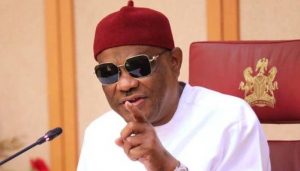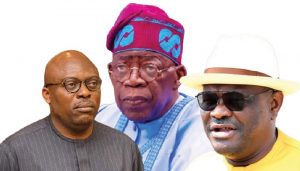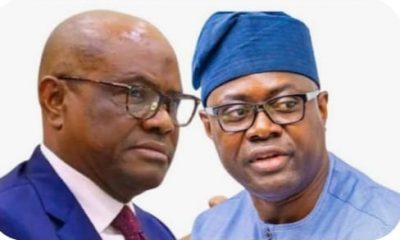society
Governor Bulldozes Parliament And No One Bothers? By Felix Oboagwina

Governor Bulldozes Parliament And No One Bothers?
By
Felix Oboagwina
I care little for former Rivers State’s Governor Nyesom Wike and the 25 pro-Wike lawmakers in the State House of Assembly. However, in their current quarrel with the incumbent Governor Simi Fubara (the godson who succeeded Wike), only one factor works against Wike in the court of public opinion: In the 2023 elections, the Rivers strongman worked for the emergence of Bola Ahmed Tinubu as President; and Tinubu has today raised Nigerians’ pain and poverty to record proportions! President Tinubu’s failures solely win for Fubara massive support in this lingering faceoff with Wike, his erstwhile godfather, predecessor and current Minister of the Federal Capital Territory.
This colourless former Rivers State Accountant-General emerged as the Dark Horse and clinched the Rivers governorship completely by the grace of Wike. How? In the penchant of political godfathers to prepare for themselves a soft post-office landing, by planting spineless acolytes as successors, Wike manipulated Fubara over far popular and formidable aspirants, and handed him PDP’s Rivers State governorship ticket. Wike financed all the campaigns, swayed the rostrum with his oratory and persona, brought in the votes and handed Fubara the election on a platter of gold. But talk of Karma. Not only has Fubara turned around to bite the fingers that moulded him, he has injured Democracy in the most unimaginable fashion.
As the Yoruba say, the new king devours the kingmaker first. Fubara turned against Wike and rubbished him. Not done, Fubara, late 2023, stormed the Rivers State House of Assembly (having majority 25-7 as Wike PDP loyalists), with police firing gunshots and water cannons to keep the rampaging Governor at bay!
His supporters thereafter set ablaze the Parliament building.
Fubara then sent the demolition squad to bulldoze the entire complex to smithereens.
Every single one of these anti-legislative steps amounted to a desecration of Democracy and an assault on a sacred institution of popular government. It amounts to treason!
This much President Tinubu told Fubara to his face when the First Citizen brokered peace between these gladiators. The Parliament, everywhere, exists as the truest representation of the people and the incontrovertible custodian of Democracy. Whereas the Executive and the Judiciary exist in other forms of government (autocracy, military, monarchical), the Legislature’s participation distinguishes Democracy from all of them. Thus, demolishing its habitation connotes the highest threat to Democracy. The Congress is an institution; and we have always mouthed the need to build strong institutions as opposed to strong politicians.
Fubara went further. Most recently, he AGAIN stormed the makeshift accommodation that the Rivers Parliament resorted to at the Assembly Quarters. Then, on May 10, “Emperor” Fubara enacted an Executive Order to force the House of Assembly to hold its sittings inside the Government House! Sacrilege! Whatever happened to the Doctrine of the Separation of Powers?
Imagine the contradiction. An Executive Order passed on the Legislature! The Executive ORDERS the Legislature! How can? Nowhere does the Constitution place the control of the Legislature (and the Judiciary) under the Executive.
These assaults the Rivers State Legislature has endured.
Pray, who advises this guy?
The Legislature is made so potently powerful that the Constitution allows it to overrule the Governor and railroad a Bill into law without his consent.
Section 96(5) says:
Where the Governor withholds assent and the bill is again passed by the House of Assembly by two-thirds majority, the bill shall become law and the assent of the Governor shall not be required.
Even the budget of the Legislature, like that of the Judiciary, goes by first-line charge, all in order to ensure its independence and the Separation of Powers.
How can a Governor with the vast resources at his disposal prove incapable of lobbying, courting and winning over the State House of Assembly, and instead His Excellency resorts to thuggish, strong-arm tactics? You wonder what terror this character wouldn’t unleash if backed by a Rivers State Police Force completely at his beck and call!
Fubara-Wike’s wahala factionalised the House of Assembly 25 to seven and the Accountant-General-turned Governor chose to work with the minority, in clear violation of Section 96 that says:
(1) The quorum of a House of Assembly shall be one-third of all the members of the House.
(2) If objection is taken by any member of a House of Assembly present that there are present in that House (besides the person presiding) fewer than one-third of all the members of that House and that it is not competent for the House to transact business, and after such interval as may be prescribed in the rules of procedure of the House, the person presiding ascertains that the number of members present is still less than one-third of all the members of the House, he shall adjourn the House.
The majority of Rivers legislators, for political expediency and most likely to take cover under the Federal might, crossed carpet to the ruling APC.
Commissioners are resigning from Fubara’s cabinet, citing the toxic atmosphere working with him.
The 23 local government chairmen have drawn a battle line with him.
All these could be predictable because most of those officials owe their emergence in office and pledge loyalty to Wike. They all jumped ship after Fubara, egged on by whomever, flung reconciliation with Wike against the rocks.
Contrary to President Tinubu’s peace agreement that Fubara and Wike’s group signed December 2023 at Aso Rock, the Governor refused to re-present the 2024 budget to the State House of Assembly, continuing to work with an illegal Appropriation Act passed by a mere seven out of 32 lawmakers. This he did even when, in the spirit of that agreement, the majority Wike group of legislators withdrew their lawsuits against him and aborted impeachment proceedings on the understanding that the budget would be properly presented for passage.
Bottom line? The crisis in Rivers goes beyond a Fubara-Wike brouhaha. It queries the very essence of Nigeria’s Democracy and the sanctity of the Nigerian Constitution. Everyone taking sides does so with the mentality of “the enemy of my enemy is my friend.” But power corrupts and absolute power corrupts absolutely. Those beating the drum for Fubara’s dance of madness are pushing Nigerian Democracy to ride the back of a tiger. How do you end the ride without Democracy ending up as a meal down the tiger’s throat? If Fubara’s style of burning, demolishing and choking the Legislature becomes a culture, then what fate befalls this Democracy? If the President takes a cue and chooses to tackle the National Assembly in a similar style? What species of Legislature will the Upper and Lower Chambers turn to, being Executive-ordered to perform legislative duties right inside the Aso Rock Villa, under the nose of the President?
The problem that lovers of Democracy must tackle is stopping Fubara becoming a role model for how the Executive can emasculate and stifle the Legislature’s independence at the state and Federal levels. Or are we going to let Fubara get away with this abuse of the Parliament because of the disdain we nurse for his adversaries, Wike and Tinubu?
OBOAGWINA IS AN AUTHOR, JOURNALIST AND PUBLISHER, REACHABLE VIA: [email protected]
society
Ramadan: Adron Homes Felicitates Muslims, Preaches Hope and Unity

Ramadan: Adron Homes Felicitates Muslims, Preaches Hope and Unity
Adron Homes & Properties Limited has congratulated Muslim faithful on the commencement of the holy month of Ramadan, urging Nigerians to embrace the virtues of sacrifice, discipline, and compassion that define the season.
In a statement made available to journalists, the company described Ramadan as a period of deep reflection, spiritual renewal, and strengthened devotion to faith and humanity.
According to the management, the holy month represents values that align with the organisation’s commitment to integrity, resilience, and community development.
“Ramadan is a time that teaches patience, generosity, and selflessness. As our Muslim customers and partners begin the fast, we pray that their sacrifices are accepted and that the season brings peace, joy, and renewed hope to their homes and the nation at large,” the statement read.
The firm reaffirmed its dedication to providing affordable and accessible housing solutions to Nigerians, noting that building homes goes beyond structures to creating environments where families can thrive.
Adron Homes further urged citizens to use the period to pray for national unity, economic stability, and sustainable growth.
It wished all Muslim faithful a spiritually fulfilling Ramadan.
Ramadan Mubarak.
society
Underfunding National Security: Envelope Budgeting Fails Nigeria’s Defence By George Omagbemi Sylvester

Underfunding National Security: Envelope Budgeting Fails Nigeria’s Defence
By George Omagbemi Sylvester | Published by saharaweeklyng.com
“Fiscal Rigidity in a Time of Crisis: Lawmakers Say Fixed Budget Ceilings Are Crippling Nigeria’s Fight Against Insurgency, Banditry, and Organized Crime.”
Nigeria’s legislature has issued a stark warning: the envelope budgeting system; a fiscal model that caps spending for ministries, departments, and agencies (MDAs) is inadequate to meet the country’s escalating security challenges. Lawmakers and budget analysts argue that rigid fiscal ceilings are undermining the nation’s ability to confront insurgency, banditry, kidnapping, separatist violence, oil theft and maritime insecurity.
The warning emerged during the 2026 budget defence session for the Office of the National Security Adviser (ONSA) at the National Assembly in Abuja. Senator Yahaya Abdullahi (APC‑Kebbi North), chairman of the Senate Committee on National Security and Intelligence, decried the envelope system, noting that security agencies “have been subject to the vagaries of the envelope system rather than to genuine needs and requirements.” The committee highlighted non-release or partial release of capital funds from previous budgets, which has hindered procurement, intelligence and operational capacity.
Nigeria faces a multi‑front security crisis: persistent insurgency in the North‑East, banditry and kidnappings across the North‑West and North‑Central, separatist tensions in the South‑East, and piracy affecting Niger Delta oil production. Despite declarations of a national security emergency by President Bola Tinubu, lawmakers point to a “disconnect” between rhetoric and the actual fiscal support for agencies tasked with enforcement.
Experts warn that security operations demand flexibility and rapid resource allocation. Dr. Amina Bello, a public finance specialist, said: “A static budget in a dynamic threat environment is like sending firefighters with water jugs to a forest fire. You need flexibility, not fixed ceilings, to adapt to unforeseen developments.”
The Permanent Secretary of Special Services at ONSA, Mohammed Sanusi, detailed operational consequences: irregular overhead releases, unfulfilled capital appropriations, and constrained foreign service funds. These fiscal constraints have weakened intelligence and covert units, hampering surveillance, cyber‑security, counter‑terrorism and intelligence sharing.
Delayed capital releases have stalled critical projects, including infrastructure upgrades and surveillance systems. Professor Kolawole Adeyemi, a governance expert, emphasized that “budgeting for security must allow for rapid reallocation in response to threats that move faster than political cycles. Envelope budgeting lacks this essential flexibility.”
While the National Assembly advocates fiscal discipline, lawmakers stress that security funding requires strategic responsiveness. Speaker Abbas Ibrahim underscored that security deserves “prominent and sustained attention” in the 2026 budget, balancing oversight with operational needs.
In response, the Senate committee plans to pursue reforms, including collaboration with the executive to restructure funding, explore supplementary budgets and ensure predictable and sufficient resources for security agencies. Experts warn that without reform, criminal networks will exploit these gaps, eroding public trust.
As one policy analyst summarized: “A nation declares a security emergency; but if its budget does not follow with real resources and oversight, the emergency remains rhetorical.” Nigeria’s debate over envelope budgeting is more than an accounting dispute; it is a contest over the nation’s security priorities and its commitment to safeguarding citizens.
society
Rev. Mother Kehinde Osoba (Eritosin) Celebrates as She Marks Her Birthday

Rev. Mother Kehinde Osoba (Eritosin) Celebrates as She Marks Her Birthday
Today, the world and the body of Christ rise in celebration of a rare vessel of honour, Rev. Mother Kehinde Osoba, fondly known as Eritosin, as she marks her birthday.
Born a special child with a divine mark of grace, Rev. Mother Eritosin’s journey in God’s vineyard spans several decades of steadfast service, spiritual depth, and undeniable impact. Those who know her closely describe her as a prophetess with a heart of gold — a woman whose calling is not worn as a title, but lived daily through compassion, discipline, humility, and unwavering faith.
From her early days in ministry, she has touched lives across communities, offering spiritual guidance, prophetic insight, and motherly counsel. Many testify that through her prayers and teachings, they encountered God in a deeply personal and transformative way. Near and far, her influence continues to echo — not only within church walls, but in homes, families, and destinies reshaped through her mentorship.
A mother in every sense of the word, Rev. Mother Kehinde Osoba embodies nurture and correction in equal measure. As a grandmother, she remains energetic in purpose — accommodating the wayward, embracing the rejected, and holding firmly to the belief that no soul is beyond redemption. Her life’s mission has remained consistent: to lead many to Christ and guide them into the light of a new beginning.
Deeply rooted within the C&S Unification, she stands tall as a spiritual pillar in the Cherubim and Seraphim Church globally. Her dedication to holiness, unity, and prophetic service has earned her widespread respect as a spiritual matriarch whose voice carries both authority and humility.
As she celebrates another year today, tributes continue to pour in from spiritual sons and daughters, church leaders, and admirers who see in her a living reflection of grace in action.
Prayer for Rev. Mother Kehinde Osoba (Eritosin)
May the Almighty God, who called you from birth and anointed you for His service, continually strengthen you with divine health and renewed vigour.
May your oil never run dry, and may your prophetic mantle grow heavier with greater glory.
May the lives you have nurtured rise to call you blessed.
May your latter years be greater than the former, filled with peace, honour, and the visible rewards of your labour in God’s vineyard.
May heaven continually back your prayers, and may your light shine brighter across nations.
Happy Birthday to a true Mother in Israel — Rev. Mother Kehinde Osoba (Eritosin).
More years.
More anointing.
More impact.
If you want this adapted for a newspaper page, church bulletin, Facebook post, or birthday flyer, just tell me the format and tone.
-

 celebrity radar - gossips6 months ago
celebrity radar - gossips6 months agoWhy Babangida’s Hilltop Home Became Nigeria’s Political “Mecca”
-

 society6 months ago
society6 months agoPower is a Loan, Not a Possession: The Sacred Duty of Planting People
-

 society5 months ago
society5 months agoReligion: Africa’s Oldest Weapon of Enslavement and the Forgotten Truth
-

 news6 months ago
news6 months agoTHE APPOINTMENT OF WASIU AYINDE BY THE FEDERAL GOVERNMENT AS AN AMBASSADOR SOUNDS EMBARRASSING













